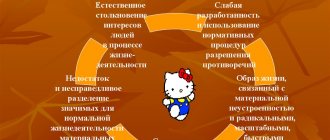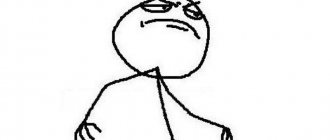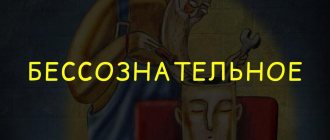Greetings, friends!
Every person knows and periodically uses the word “instinct”. For example, when explaining an unintentional action, we can say: “I did it instinctively.” However, many of us misunderstand what instinct is, with the result that the phrase often sounds like an inappropriate excuse. Today we will try to fill this gap and analyze in detail what instinct is. We will talk about the nature of this phenomenon, look at several examples and find out whether humans have instincts.
What is instinct?
Instinct is a pattern of behavior inherent at the genetic level, the purpose of which is to satisfy a specific need. Unlike a reflex, which is a single response to a specific stimulus, instinct implies a rather complex sequence of actions. All living beings have instincts aimed at solving such important problems as survival, food and procreation.
The term "instinct" comes from the modern Latin word instinctus, which has the same meaning. But the concept itself appeared earlier. Aristotle (4th century BC) suggested the existence of an “animal soul” that determines the behavior of animals. Later, the Athenian Stoic Chrysippus (3rd century BC) used the word ὁρμή (ormi) for this phenomenon, which became the equivalent of the word “instinct” in ancient Greek.
Instincts should not be confused with reflexes. The task of the reflex is to react in a timely manner to a specific stimulus. The task of instinct is to ensure that certain actions are carried out to ensure survival and procreation. Some instincts are common to all living organisms, while others are characteristic only of representatives of a certain species. The most complex instincts are observed in human behavior (the desire for power, recognition, social interaction, self-realization, self-development).
Many reputable psychologists denied the existence of instincts in human nature. Thus, Sigmund Freud believed that human romantic and sexual behavior is too complex to be explained by animal instincts (to explain this point of view, he developed the “Theory of Drives”). Abraham Maslow (the author of the hierarchical model of human needs) believed that people do not have instincts, since they, unlike animals, are able to restrain any impulses through willpower. According to Maslow, instincts in the human psyche are completely supplanted by thinking and replaced by emotions.
The biological meaning of instinct is to force an animal to perform a complex sequence of actions, some of which may be contrary to its current desires. Nevertheless, the animal carries out this “program,” thereby ensuring the survival of itself and its species. Instincts also manifest themselves in humans, but, unlike animals, he himself determines how he will act in order to realize the aspirations that arise in him. In other words, a person cannot control the activation of instinct, but is able to control its manifestation.
Human instincts and what are they?
This topic is so controversial and controversial that debates on it have been going on for more than a hundred years. With varying success: first one direction wins, then the other. Unfortunately, this topic, like everything related to humans, is very politicized. Such topics have long since moved from purely scientific to the “service sector.” Serving certain political and ideological movements. I have already explained this in detail in the article “Man, Woman and Scientists”, I will not repeat it. The article will already be long and not at all entertaining, even a bit boring.
First, let's define the term. What is instinct? In biology, instinct, in short and simplified terms, is understood as a stereotypical motor act that occurs in an animal in response to a certain need or serves a certain purpose. This act, I repeat, is stereotypical. I will give examples. After defecation, a cat “buries” feces in the ground with its hind legs, thus masking its presence from enemies. Everyone has seen this. But she makes the same movements in the apartment, when there is simply nothing to “bury” with: there is no earth under her paws. This is a stereotypical behavioral act - it does not change. The set of actions is always fixed. I went to the toilet and made these movements with my paws. Is there linoleum under your feet? It doesn’t matter, the program of action does not change. Such stereotypical acts also include the weaving of a web by a spider, mating dances and songs of birds, etc.
Humans (and primates in general) do not have such rigid motor complexes. Human behavior is much more complex. Therefore, we can replace the word “instinct” in relation to a person with the word “drive”, “innate behavioral program” (note, not motor, but behavioral). Call it what you like best. I like the word "instinct" because it is familiar to people's ears. In addition, I came across it in a huge number of foreign scientific articles.
So, during the mating season, the nightingale sings the same melody to attract a female. It is reproduced by absolutely every nightingale and for thousands of years. This is exactly what biologists call instinct.
People's behavior is not so strictly determined. Therefore, it is wrong to transfer animal behavior to humans. Rather, a person has a certain behavioral pattern that arises in response to a need. Let's compare it to animals again. The sexual instinct of the black grouse forces it to “dance” a certain dance on the lek (that is, to perform strictly programmed body movements), and then mate in a certain way. Also programmed. The human sexual instinct does not work quite like that. Instinct sets the owner a certain task, useful from a biological point of view. A man's job is to mate with as many women as possible in order to spread his genes as widely as possible. How he will do this is not clearly fixed. Will he force them, take them by deception, imitate a high rank, bribe them (“sex for food”) - there are many ways. A woman's instinct is to conceive from the most viable man within reach, in order to increase the survival rate of the offspring. Again, the motor program is not fixed. A woman can arrange an “auction” so that men can prove who is better. And then he will choose the “winner”. Maybe, on the contrary, she can find the “alpha” herself and somehow convince him to mate. In general, there are many options. Instinct clearly sets the final goal, a useful adaptive result, in the language of physiology, but does not strictly program the methods for achieving it.
In general, there are very different views on these terminological subtleties. For example, Yakov Kantor from the University of Chicago called what I call instinct instinctive behavior, and interpreted the term “instinct” in the biological sense that I described above [3]. Amanda Spink defines the term “instinct” as “an innate part of behavior that occurs without any training or education in people.” At the same time, she argues that such behaviors as raising children, cooperation, sexual behavior and aesthetic perception are developed psychological mechanisms with an instinctive basis [4]. If anyone is interested, you can search for keywords on English-language search engines, there is a lot of disagreement there.
Also, instinct should not be confused with an unconditioned reflex. Both are innate. But there are fundamental differences. The reflex is not related to motivation. This is a very simple motor act that occurs in response to one simple stimulus. For example, the knee jerk reflex occurs in response to a stretch of the quadriceps. We withdraw our hand from something hot due to a reflex act, which is triggered by very strong irritation of the temperature receptors of the skin. The reflex has a very rigid motor characteristic. The knee-jerk reflex absolutely always ends with a contraction of the quadriceps, and nothing else.
Instinct is always associated with a certain motivation. Sexual instinct - with sexual motivation, food instinct - with food motivation, etc. Instinct is always a complex behavioral act that does not have a rigid program.
So, we figured out the term. I will use the word "instinct" in accordance with what I explained above. Perhaps this is not entirely true from the point of view of biology, but it is justified from the point of view of explaining the essence of the matter. If someone likes a different concept that denotes all this, that’s his right.
Next, I’ll say a few words about views on the role of instincts in human behavior. There are two radical and equally erroneous approaches to this issue.
The first is biogenetic, or biologization. Proponents of this approach argue that instincts are the only factor that completely determines human behavior. The social superstructure means little or nothing. Ordinary biologists consider humans to be ordinary animals and call them naked monkeys. That is, they take biologization to the point of primitivism. This approach is incorrect, since man is not only a biological, but also a social being. He has a personality - a structure that is formed in society, albeit on the basis of a biological foundation, albeit closely interacting with it.
The second approach is sociogenetic, or sociologization. Proponents of this approach argue that the biological basis of a person does not affect anything at all. Everything - from character to gender-role behavior - is determined by the influence of society. A person is born like a blank hard drive onto which society “installs programs.” Sociologizers deny not only innate biological needs, drives, and behavioral programs, but even such biological data as sex, replacing it with the word “gender.” Initially, sociologization appeared and developed in the Soviet Union, where everything was subordinated to Marxism. And Marxism preached that everything is determined only by the influence of the environment. Now sociologization is gaining great weight and strength all over the world due to the strengthening of leftist ideology, feminism, globalism and serious funding in this area in recent decades. It is required to wrap the ideology in a “scientific” package, to “prove” its correctness, and huge funds are allocated for this. The result is subject to two sayings: “any whim for your money” and “he who pays calls the tune.” Therefore, in the scientific world, sociological music is now playing louder and louder. If, of course, one can call serving ideological interests science. However, if you type the words “human instincts article” into a search engine, you will get a bunch of scientific articles about the study of instincts in people. It is better to type it into an English-language search engine, as it searches for English-language texts better.
I do not exclude the possibility that the pendulum will swing in the other direction. If tomorrow the ruling circles need to “prove” that man is driven solely by animal motives, that man is supposedly just a “naked ape,” then they will prove it, I guarantee. History shows us that politicized “science” has “proved” not such nonsense. Money, administrative resources and manipulation of public opinion have worked other miracles.
The correct approach, in my opinion, is the psychogenetic one. He argues that human behavior is not shaped by EITHER biological OR social, but by BOTH biological AND social. Textbook “Psychology” edited by Doctor of Psychology, Prof. V.N. Druzhinina explains the innate programs of human behavior (what we agreed to call “instinct”) as follows: “At birth, we have a set of genetically specified programs for interaction with the outside world. Moreover, these programs are of a generalized nature...” But, on the other hand, a person’s personality is formed in society, under the influence of social factors. So behavior is influenced by temperament (also an innate characteristic of the nervous system), instincts, upbringing, culture, learning, experience, and much more. Unfortunately, the psychogenetic approach is not popular - I believe, due to the fact that there have not yet been political and ideological interests that could find in it “scientific confirmation” of their philosophical, sociological or political ideas.
Now about the ethical interpretation of instincts. Battles are also being waged on this basis, but not in the scientific (or “scientific”) world, but at the level of journalism. Again, there are two schools of thought. The first asserts that instincts are natural, therefore, they must be completely obeyed, and they should not be regulated, much less limited. The other argues that instincts are an animal essence, and therefore must be eliminated. As in the previous question, these two radical views are more fanatical than reasonable. Human behavior is determined both biologically and socially. Therefore, being afraid of or trying to “erase”, “destroy”, “eradicate” instincts is not only harmful (you can drive yourself to neurosis or something worse), but also stupid. The human body is also biological, but no one calls it “animal essence” or suggests “getting rid of it.” At the same time, we need to understand that we live in a society that, for our own good and safety, exists according to certain canons (law, morality), which we will have to follow, controlling our instincts. And this is not some kind of violence against oneself - a common way to streamline interpersonal interaction, minimizing the likelihood of conflicts and other problems.
Therefore, in this article we completely reject any ethical coloring of human instincts. We view them not as positive or negative phenomena, but as a fact - from a neutral point of view.
So, instincts. The number of instincts identified varies among different authors. For example, M.V. Korkina and co-authors distinguish food, self-preservation and sexual instincts [1]. The same instincts (with the addition of “etc.”) are listed by A.V. Datius [2]
I identify seven instincts.
1. Food. This is perhaps one of the simplest instincts. Hunger, thirst - we are looking for something to quench them.
2. Defensive (instinct of self-preservation). It is designed to protect us from troubles, and if such appear, then to make every effort to survive. The derivatives of this instinct are such human properties as caution or its extreme manifestation - cowardice. This is about the avoidance part. As for the other part - survival, this is the usual activation of the sympatho-adrenal system during stress. Thus, the defensive instinct gives us the strength to fight if there is a chance of winning, or to run away if the chance of victory is low. The pupils dilate (the field of view increases), the bronchi also (more oxygen is needed), the blood supply to the brain increases (make quick decisions), muscles (fight, run, etc.) and the heart (pump blood faster). In other organs, the blood supply weakens - there is no time for them. This is a short excursion into physiology.
3. Sexual. I have written a bunch of articles and book chapters about this instinct. More details can be found in the book “Female and Male Manipulations,” Chapter 2 (“Rank, Primacy...”). I won’t retell it here.
4. Parental. This is an instinct to care for offspring. For some reason, it is often called maternal - as if it is not characteristic of fathers. However, it is not. Men often have stronger parental instincts than women.
5. Herd (social). Man is a social being, and without society he does not become a man as such. For example, speech is formed entirely in society, and in the early years. People whose childhood was spent in a wild environment could not learn to speak. For years they tried and failed. Also in society, a person’s personality (as a psychological concept) is formed on a biological foundation. Herding (or sociality) is an ancient property of primates that has been passed on to humans. Therefore, a person strives to be among other people. Outside of society, alone, people go crazy.
6. Hierarchical (rank). Rank instinct is one of two terms of rank (the second term is rank potential). I also wrote a lot about this, as well as about the essence of the rank instinct itself, in the chapter “Rank and Primacy.” You can read it in the same book, “Female and male manipulation.” Or on the website, here. A three-part chapter, remember. Here's a link to the first part.
The ranking instinct often conflicts with the instinct of self-preservation. The rank instinct demands to challenge the stronger and take his place in the hierarchy, and the instinct of self-preservation “dissuades” from this.
7. Instinct of energy conservation (instinct of least costs). If the first four instincts are familiar to absolutely everyone, the next two are familiar to those who have read my works, then this one is familiar to almost no one. Meanwhile, it has a very healthy influence on our behavior. The essence of instinct is to choose the simplest solution to achieve a goal, or to abandon it altogether if all the paths seem difficult. This instinct has several effects, I will give an example of three.
The first is laziness. If two motivations are fighting within us, approximately equal in importance, strength and method of implementation, then we will choose to reject both of them. For example, we postpone a decision if in any case the result will be unpleasant to us. If we feel that the way to realize motivation is difficult and unpleasant, then we abandon this idea. A student skips his first class to sleep. It is too difficult and unpleasant for him to get up. It's easier not to walk. It is clear that this only works if motivation is weak. I have never seen a person who would be too lazy to find a toilet when he has an urge. So, a person is lazy - this means that the motivations are too weak for him, and it is easier for him not to fulfill them in order to save energy.
The second is theft and all its forms (robbery, fraud, etc.). It is too difficult for a person to earn goods, but to steal, take away, and deceive is not so difficult, in his opinion. In this way, he also saves energy, although in society such behavior is considered criminal and is punished. And not only in society: if one monkey is caught stealing from another, he may get punches. However, stronger individuals (both males and females) take away the food of the weaker ones. They also save energy. In this incarnation, the instinct of energy conservation comes into conflict with the instinct of self-preservation, because adds danger.
And third. If the first two manifestations of this instinct were socially disapproved and even criminal (theft, robbery, fraud), then here everything is the other way around for the benefit of society. This is the desire to make your work and life in general easier with the help of all sorts of ideas. First of all, this is invention. The second thing is pioneering. After all, those who discovered new lands wanted to make life easier for themselves and their children.
Here is a brief overview of the essence of human instincts. They, interacting with each other, as well as with the social factor (personality), influence human behavior. Some are stronger, some are weaker. The degree of influence of instincts on behavior is called primativity. I also wrote about her many times. Both about its essence (chapter “Rank and Primacy”, posted on the website), and about the scientific justification of this term and testing it using Popper’s criterion (chapter “On instincts, education and primacy”).
1. Datius, A.V. Forensic medicine and psychiatry: Textbook. - M.: RIOR, 2011. - 310 p.
2. Psychiatry: Textbook for students. honey. universities / M.V. Korkina, N.D. Lakosina, A.E. Lichko, I.I. Sergeev. — 3rd ed. - M.: MEDpress-inform, 2006. - 576 p.
3. Kantor, JR A Functional Interpretation of Human Instincts. Psychological Review, 27 (1920): 50-72
4. Spink, A. Information behavior. An evolutionary instinct. Dordrecht: Springer, 2010. 85 p.
Human instincts
Instincts in people are activated at an unconscious level and at this stage they act in the same way as in animals. We feel them as desires, emotions and needs, but we have the opportunity to independently choose how to implement them. At the same time, the implementation of an instinct usually brings a feeling of satisfaction, while the inability to realize it causes severe emotional discomfort. Therefore, the claim that a person can control his instincts is wrong. It’s just that, unlike animals, he has more freedom in choosing the way to realize these instincts.
In essence, our instincts are the evolutionary experience of our ancestors, accumulated and transmitted in genetic memory. Some behavior patterns turned out to be more successful and provided increased vitality to individual individuals, due to which they were fixed in genes. For example, the formation of monogamous couples and joint care of children are embedded in us at the genetic level, since hundreds of thousands of years ago such behavior helped our ancestors to survive and successfully raise viable offspring.
Examples of instincts
As a first example, consider the most obvious instinct - the instinct of self-preservation. It is characteristic of all types of living beings. Even the simplest animals strive to escape from predators and any other dangers. Quite often this instinct manifests itself in the form of unreasonable fears. So many people are afraid of heights, instinctively trying to grab something tightly (like our ancestors grabbed branches and vines). Others are afraid of water, so they experience discomfort even while on board a large ship. This is also a manifestation of the instinct of self-preservation.
The second example is the instinct of procreation. All animals also have it, but it manifests itself more diversely than the previous one. In some animals it is limited to sexual intercourse, after some time after which the female lays eggs and abandons the clutch (as in some turtles). Other animals form pairs and raise offspring together, but then separate and form new pairs the following season. Many animals are monogamous (some to a much greater extent than humans).
As a third example, consider maternal instinct. It can be considered an independent phenomenon or part of the reproductive instinct. It is usually activated after the first pregnancy and can manifest itself not only in caring for one’s own offspring, but also in the desire to protect the weak. Maternal instinct is characteristic of both humans and almost all animals. There are many known cases where in zoos females of one species raise orphaned cubs of other species.
Classification of instincts
Human instincts are aimed at realizing the basic needs inherent to our species. The most important are 7 instincts:
- Self-preservation. This is a basic instinct that appears in all animals immediately after birth. The child cries so that he will not be left without attention. Growing up, he learns to distinguish dangers and avoid them. At the same time, he acts in accordance with his life experience, but the desire to avoid danger is instinctive.
- Continuation of the family. This instinct is just as important as the previous one, since its task is to ensure the preservation of the population. The reproductive behavior of animals of different species is very different, but in all cases it is due precisely to the instinct of procreation.
- Curiosity. Surely you have noticed that curiosity is characteristic of many animals. This is how the research instinct manifests itself. Dogs, cats, birds and even fish study with interest everything new and incomprehensible. This allows them to understand in advance which objects pose a danger and which may be useful.
- Dominance. The instinct of dominance exists in many animals, but in humans it is especially pronounced. Even if a person does not strive for power, he still wants to have influence on others, to be a “gray eminence.”
- The desire for freedom. This instinct manifests itself even in an infant who resists when they try to swaddle him. Growing up, the child violates the prohibitions of his parents. Even if the violation itself does not bring him anything, he rejoices in the fact that he satisfies his instinct for freedom.
- Adaptation. Any animal and person undergoes gradual adaptation to the environment and living conditions. The ability to adapt is also inherent in our nature on an instinctive level.
- Social communication. The communicative instinct makes us strive to communicate with other people, do business together and help each other.
Examples
In modern people, like thousands of years ago, the instinct of life is reactions that have a behavioral form of expression. They become more pronounced in situations that pose a danger to health and life.
Scientists believe that consciousness is an instinct, therefore, when danger is perceived, mechanisms assigned to self-preservation begin to operate.
If a person understands that he may be in danger, ready-made stimuli act in the subconscious. In people, this manifests itself as a fear of spiders, the dark, and heights.
Instinct is an innate feeling, like self-preservation, that begins to act when life is threatened. Then the person tries to escape at any cost
Such reactions manifest themselves as follows:
- when burned, a person withdraws his hand;
- dresses in the cold;
- if there is not enough air, it goes out into the air;
- If he doesn't know how to swim, he doesn't go into the water.
The need to procreate causes the desire to give birth to a child and raise him.
In people, instinct is a reaction that they can control, but in some it can take on inappropriate forms. For example, maternal instinct turns into overprotection or, conversely, into a careless and irresponsible attitude towards one’s own children.
The first instinct is self-preservation, but the others are no less important for life. Maternal innate instincts manifest themselves in girls in the desire to play with dolls. They are more clearly visible in women expecting a child, when the expectant mother begins to arrange housing.
Instinct is nature, which explains some of the behavioral features of men, which are determined by the fact that the male wants to get a female for procreation, but if the conquest is too easy, the prey quickly becomes boring. Such men become avid bachelors with increased libido.
Positive instincts are social, for example, if a person has expressed altruism, he strives to help others, he can become a doctor, psychologist, or volunteer.
People who actively defend their personal freedom express protests from early childhood and have a pronounced instinct for freedom. They turn into politicians, journalists, public figures.
Natural instinct is a complex act of innate behavior. It has two main features:
- independent of the internal state of the body;
- the stimulus acts only as a trigger for instinctive behavior and does not oblige the entire act to be carried out.
Attention! Darwin believed that instinct is the unconscious, that this type of behavior is characteristic of a particular species and is fixed hereditarily.
Differences between instincts and reflexes
To better understand what instinct is, it is important to correctly understand how it differs from a reflex. The fundamental difference is that a reflex is a reaction of the nervous system that occurs immediately in response to a certain stimulus. Some reflexes can be restrained by willpower, but most of them are not under the control of our mind and will. There are two types of reflexes:
- Unconditioned reflexes. They are also called “congenital” or “specific”. They are embedded in genes and are characteristic of all individuals of one biological species. They manifest themselves regardless of life experience.
- Conditioned reflexes. They are also called “worked out”. They are formed during life to ensure a quick response to positive and negative environmental factors. If a conditioned reflex loses its relevance, it weakens and may disappear completely.
Despite significant differences, unconditioned and conditioned reflexes have a common nature and approximately the same trigger mechanism. The nerve impulse received from the receptor passes along the reflex arc and excites the systems (muscles or glands) that provide a response. All reflexes occur automatically and without awareness, and their cause is always some kind of irritant.
Unlike reflexes, instinct is a complex pattern of behavior that is not limited to the activation of a specific muscle or the secretion of a gland. Instinct can be compared to a trigger mechanism, the activation of which launches a complex program of actions. In this case, the program can be very conditional. Instinct arises as a strong need that requires satisfaction. And how exactly to satisfy it depends on the animal or person.
Acquired Instincts
Acquired instinct is the habits that each person develops in accordance with his innate inclinations. These are not hereditary traits. Such an instinct is an unconditioned reflex that is activated when a person needs to perform a certain action.
Unconditional instinct is a reaction aimed at increasing safety and survival in extreme conditions. They can be not only positive, but also negative.
Positive is a mixture of good instincts to increase the survival rate and safety of society. These include decency, friendliness, and conscientiousness.
Negative instinct is in psychology acquired qualities, such as meanness, cynicism, deception. They are formed in groups of people with an increased level of the leading component.
Have human instincts disappeared?
As noted above, many famous authors believed that man does not have instincts, since they were supplanted by reason. However, from the point of view of modern psychology, such a statement is erroneous. A person really controls his own behavior and when making decisions he is guided not by instincts, but by common sense. But this does not negate the fact that many of our desires, goals and aspirations are dictated precisely by instincts. Our difference from animals lies only in the fact that we ourselves choose how to satisfy our own needs and desires.
We fully have the instinct of self-preservation. In critical situations, it often takes precedence over reason, as a result of which a person begins to panic and behave irrationally. But the older and more experienced we become, the easier it is to cope with panic in critical situations. Another example is mating behavior, which in people is highly “regulated” by culture. Each of us from a young age understands that there are some rules that determine what a romantic relationship should be like and on what date you can kiss. However, the very desire to enter into such relationships is dictated by nothing more than the instinct of procreation.
Thus, no matter how intelligent human activity is, it is still motivated by the most ordinary instincts. It’s just that instincts no longer directly control our behavior, like in animals. But the activation of instinct gives us a strong (sometimes irresistible) desire to perform some action. And how we carry them out depends on ourselves, our education and upbringing, moral and moral principles. All people have instincts and persist throughout life, but we restrain them, since their uncontrolled manifestation causes condemnation in modern society.









